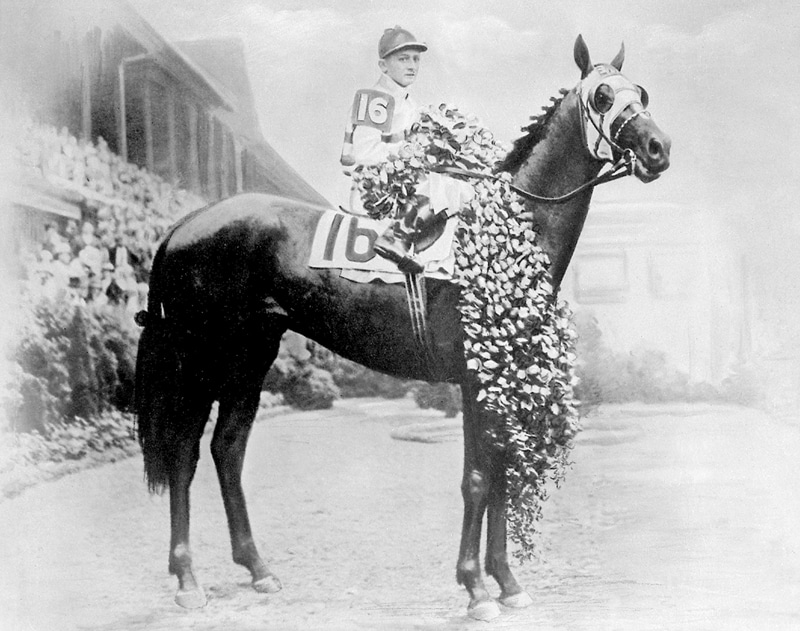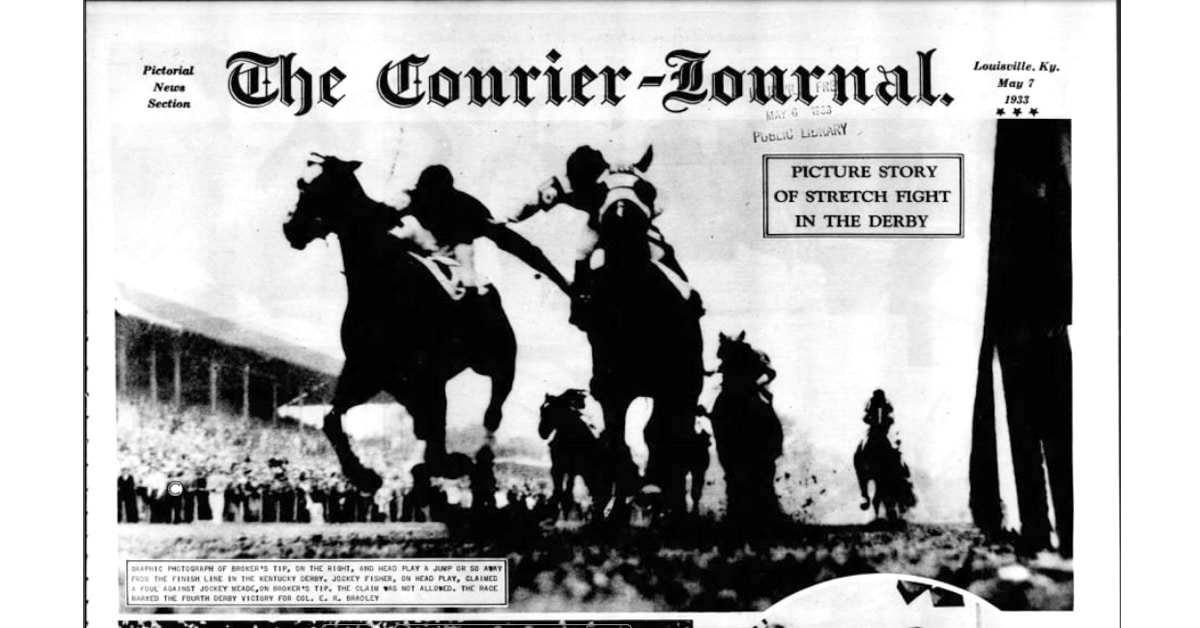When the bugle blew for the 1933 Kentucky Derby, 40,000 eager fans snapped to attention. They had spent the day sipping mint juleps, socializing, and perhaps humoring the many hawkers who swarmed the track, but all conversations stopped as thirteen magnificent thoroughbreds began to parade before the grandstand. As the crowd cheered, the horses trotted to the gates, prancing, with their riders trying (and mostly failing) to calm them down. All eyes were upon two horses: Ladysman and Head Play.
Only a few people noticed a third, dangerous contender called Broker’s Tip, several stalls to their right.
The gates closed and the horses were bathed in darkness. The spectators watched intently as the horses fretted, tossed their heads, and caused a ruckus. For eight long minutes, the crowd waited apprehensively as the tension built. After what seemed like an eternity, the horses finally quieted. The bell rang, the gates flew open, and the horses exploded forwards.
Several days and $30,000 earlier, a prominent owner named Mrs. Silas B. Mason approached a humble trainer called Willie Crump. With the Kentucky Derby just days away, she wanted to purchase the best horse in his barn: Head Play. Costing Crump a grand total of $550 at a yearling sale, Head Play had been a bargain, but the colt had already blossomed into a veritable runner. Large and well-built, Head Play was a nephew to the indomitable Man o’ War. Mrs. Mason, hoping for her first Kentucky Derby win, was willing to pay almost anything to get the star.
On the eve of the Derby, she finally got her wish. For $30,000 and a share of the winner’s purse, Crump sold his rising star to Mrs. Mason. She decided to let the skilled Herb Fisher, swathed in her black and gold colors, ride him in America’s greatest race. She didn’t know it then, but one of the most dramatic moments in sports history was about to unfold.
As the thirteen thoroughbreds strained, fighting to gain momentum, a horse called Isiah flew into the lead. Aboard Head Play in third place, Fisher reserved his colt’s rally for when he would need it the most. The horses whirled into the first turn and galloped into the backstretch.
Head Play remained in third place, waiting. With the final turn approaching, Fisher unleashed Head Play’s drive. The colt accelerated quickly and easily passed the front runners. As he hurtled into the turn, he widened his lead, his legs flying as his head bobbed with effort. With the homestretch ahead, Fisher felt a rush of exhilaration as the wire drew nearer and nearer.
Suddenly, he noticed a movement behind him and realized that Broker’s Tip was closing fast. He hit the homestretch in front, but Broker’s Tip and his jockey, Don Meade, were still coming. With the crowd roaring, Broker’s Tip sped towards Head Play and closed the daylight between them. Abruptly, Head Play shifted and bumped into Broker’s Tip, threatening to ruin his run. Don Meade exploded at Fisher like an erupting volcano. Moving at forty miles per hour, he grabbed him. Fisher fought back furiously, grabbing his saddle cloth and trying to pull Meade off his horse, but Meade clung on and grasped at Fisher’s ankle. Tearing at each other’s shirts, saddles, and ankles, they motored past the screaming fans while the eleven other competitors raced behind. They kept on fighting, doing everything to unseat the other while urging their horses on.
As their riders battled, Head Play and Broker’s Tip refused to give in, galloping head-to-head as the finish loomed closer. With less than a hundred yards to go, both riders hauled back and slashed at each other with their whips. The fans were on their feet, cameras were flashing, and Head Play and Broker’s Tip kept racing. Trying their hearts out, they thundered past the wire together. They were so close that the stewards could not determine the winner. Without a photograph of the finish, they were forced to come to a consensus.
Broker’s Tip had won by a nose.
As Broker’s Tip’s owner, Colonel Bradley, raced to the winner’s circle to celebrate his fourth Derby victory, Don Meade brought his colt to him. Bradley was handed the massive winner’s trophy while Meade posed for the cameras, his face solemn. Quivering with rage, Fisher made his way back to the dressing room.

Jockey Don Meade on Brokers Tip following their contentious win. (Photo courtesy Keeneland Library Cook Collection)
After the ceremonies were over, Meade dismounted and walked back to the dressing room. Fisher, fuming, was waiting for him. As soon as Meade strode through the door, Fisher came running at him with both fists raised, screaming almost incoherently. He threw one arm around Meade’s neck and nearly threw him to the floor. He was quickly pulled back by reporters and valets, but he was too enraged to stop.
Fisher turned on his captors and, “rained wild blows,” on them, and then turned to attack Meade again. He tried to punch Meade, who was terrified, but his blows had little strength behind them. Screaming, “He beat me out of it! He beat me out of it!” he was pulled away again. He fought to get to Meade, but the newsmen and valets finally managed to restrain him. Inconsolable and crying, Fisher was led away. Despite winning the Kentucky Derby, Meade was “unsmiling” and somber. Afterwards, a newsman put his arm around Meade’s shoulder and tried to interview him, but he got little out of him. “I’m glad I won it for Mr. Bradley,” was all that he would say.
The sun set, the shadows lengthened, and the vast crowd dispersed. By the time that night finally swept over the world, the track was almost empty.
Five days after the Kentucky Derby, both Meade and Fisher received suspensions, although they would still be able to ride in stakes races.
Colonel Bradley gave Meade a $4,892 bonus for winning the Kentucky Derby. Both Head Play and Broker’s Tip entered into the Preakness Stakes. This time, Mrs. Mason was thrilled when Head Play galloped to a four-length victory while Broker’s Tip came last.
Broker’s Tip would never win another race. Head Play went on to become the Champion Three-Year-Old. Additionally, he racked up victories in the Suburban Handicap, the Bay Meadows Handicap, and the San Antonio Handicap. He retired with fourteen wins and $318,048 in earnings. After being sent off to stud, he sired few noteworthy horses aside from the gritty El Mono.
In an ironic twist, both Head Play and Broker’s Tip are related to the great Spectacular Bid, who came close to sweeping the American Triple Crown in 1979.
After not speaking to each other for fifteen years, Don Meade and Herb Fisher became good friends. “Personally, I think Don Meade was a great rider,” Fisher remembered, “and I think he should have been inducted into the Hall of Fame. I think he was actually that good a rider.” Don Meade also sympathized with Fisher, “If he felt that I was trying to hinder his horse in the same instant, I don’t blame him for doing what he did, either.”
The public never forgot about the “Fighting Finish.” Long after Broker’s Tip and Head Play faded from memory, the notoriety of their ferocious stretch run in the Kentucky Derby has endured. In 2006, The Blood-Horse ranked the infamous event #44 on a list called Horse Racing’s Top 100 Moments. In one afternoon, Head Play, Don Meade, Broker’s Tip, and Herb Fisher forever earned their places in racing lore.
***
A high-school student, Andrew Hanna is currently working on his first book, a biography about the magnificent racehorse Citation.


